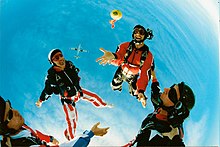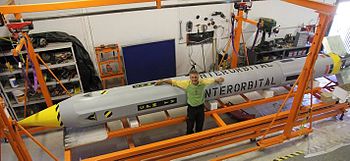| Olav Zipser | |
|---|---|
 Zipser freeflying with his Sports Emmy Award Zipser freeflying with his Sports Emmy Award | |
| Born | (1966-03-12) 12 March 1966 (age 58) Siemern, West Germany |
| Other names | 'Father of FreeFly' |
| Occupation | International Master FreeFlyer |
| Known for | Founding and developing Freeflying, Space Games |
| Awards | Sports Emmy 1995 X-Games |
Olav Zipser (born 12 March 1966, Simmern, West Germany) is a Sports Emmy Award winning German professional skydiver.
Zipser launched the freeflying movement of the early 1990s when he began experimenting with non-traditional forms of body flight. Since then, he has been part of the worldwide sport of FreeFly and has helped it grow to the Fédération Aéronautique Internationale competition level that it is at today.
Zipser is the founder of the FreeFly Training and Instruction Program, The First School of Modern SkyFlying, the Atmosphere Dolphin FreeFly Licence Program, the Space Games, and The FreeFly Astronaut Project. He was also the first to make use of Space Balls to train and test free flyers to an international standard.
Zipser completed his 21,000th skydive at Skydive Dubai in 2012. As of June 2015 he has logged more than 22,750 skydives. He has flown in 25 of the worlds wind tunnels, won more than 51 gold medals from various international skydiving competitions, has trained 14 world champion skydivers from around the world, and has flown his human body the equivalent of almost three times around the Earth at the equator.
Zipser is a member of the Human Synergy Project, and was a test pilot and astronaut in training with Team Synergy Moon (a Google Lunar X-Prize official team).
In September 2024 Zipser was inducted into the International Skydiving Hall of Fame, which honours legends, leaders and pioneers of the sport of skydiving.
Zipser is known as "the Father of FreeFly" and regarded as one of the best skydivers of all time.
The birth of FreeFly
Zipser started skydiving in the experimental phase of the Accelerated Freefall progression skydiving program in 1986, and immediately began experimenting with non-traditional forms of body flight. He studied and trained human aerodynamics in a wind tunnel for four months. From that experience he developed a new concept of human body flight, which he called FreeFly. First he trained friends, then he developed a professional FreeFly Training and Instruction Program so he could train others to become FreeFly teachers and instructors.
The First School of Modern SkyFlying

With the objective of researching, documenting, developing, teaching, training, and pushing the envelope of human flight capability, Zipser founded The First School of Modern SkyFlying in 1994. He came up with the idea of using Space Balls as independent measuring devices for constant speed (155 mph) and direction (straight down). These measurements train and test freeflyers so that they can meet an advanced international standard.
The Atmosphere Dolphin FreeFly licence program

Consisting of advanced human flight performance tests / a series of predetermined high speed aerobatic freefly manoeuvres around and with at first one then two Space Balls, in 1996 Zipser developed the Atmosphere Dolphin FreeFly License Program and awarded Atmosphere Dolphin FreeFly Licenses AD-A to AD-D. This provided the testing ground for the research and development of freeflying, and opened up the possibility for a number of high-speed human flight air games and competitions.
Through March 2007, a total of 410 FreeFlyers from 32 nations have achieved Atmosphere Dolphin FreeFly licences. Four of those have earned Atmosphere Dolphin AD-D licences.
The Space Games
In the early days of FreeFlying, Zipser wanted to bring together the world's then-best freeflyers to research, develop, and document the performance evolution of human freeflight, or freeflying.
So he devised the first human flight races, air games and competitions. Each has an open-class and a pro-class, based on his Atmosphere Dolphin FreeFly Tests. He also founded the Space Games, which incorporates double-elimination, one-on-one races; open rounds; competition rounds; the FreeFly Indie 500; the FreeFly Atmosphere Dolphin Challenge; Fastest, Slowest and Furthest competitions; Freestyle; Sky Surf; and 3way and 4way FreeFly Challenges.
The first Space Games was held in 1997 at Skydive America Palm Beach in Pahokee, Florida.
FreeFly officially recognised
Zipser won gold at America's first official FreeFly National Skydiving Championships in 2000. He competed again, and won gold at the first official Fédération Aéronautique Internationale FreeFly World Skydiving Championships and World Air Games, held in Spain in 2001.
In 1995 Zipser became the first civilian to skydive from the stratosphere when he jumped from an Ilyushin 76 at 41,667 feet over central Russia. He performed the skydive with Patrick de Gayardon for Sector No Limits Sports Watches. They set the record for exiting an aircraft from the highest altitude without oxygen and achieved FreeFly speeds of 750kmh.
Sports Emmy Award
Zipser received a Sports Emmy Award from the National Academy of Television Arts and Sciences in 1995 for his performance and aerial cinematography of ESPN's inaugural X Games that summer.
FreeFly Astronaut Project

Founded by Olav Zipser In 2009, The FreeFly Astronaut Project is a scientific research mission toward the development of appropriate techniques and survival suits for high-altitude and low Earth orbit emergency re-entry survival and rescue situations.
The aim of the project is to develop a safe and economical emergency return and rescue method to improve the odds of survival for mankind's future space pioneers and tourists in the event of a space emergency.

Launches will take place from InterOrbital Systems facilities at the Mojave Air and Space Port.
Russian spacesuit manufacturer Zvezda is providing Zipser with a specially modified Orlan Series spacesuit for his FreeFly mission.
In 2011, Zipser spent an undisclosed amount of time at the Yuri Gagarin Cosmonaut Training Center in Russia for training and collaboration on the development of a supersonic spacesuit to be used as an economical rescue and return alternative for astronauts and space tourists.
Skydive for Rhinos
When Zipser traveled to South Africa in 2012 for The Ranch SkyDiving Boogie and Symposium held at The Ranch Resort to give a presentation on the FreeFly Astronaut Project, he was exposed to the rhino poaching crisis. He came on board as an International Skydive for Rhinos Ambassador with African Conservation Trust's Skydive for Rhinos campaign.
See also
References
- British Parachute Association article, retrieved 10 Sep 2012
- http://parachutistonline.com/columns/profiles/olav-zipser-d-11733 Archived 15 July 2015 at the Wayback Machine Parachutist Online Olav Zipser Profile, retrieved 4 June 2015
- http://parachutistonline.com/columns/profiles/olav-zipser-d-11733 Archived 15 July 2015 at the Wayback Machine Parachutist Online Olav Zipser Profile, retrieved 4 June 2015
- Tara, Wood. "Skysurfer seeks challenge (page1)". Arizona Daily Star. No. 6 August 1995. Archived from the original on 5 March 2022. Retrieved 5 March 2022.
- Tara, Wood. "Skysurfer seeks challenge (page2)". Arizona Daily Star. No. 6 August 1995. Archived from the original on 5 March 2022. Retrieved 5 March 2022.
- Pilots Post article Archived 13 April 2014 at the Wayback Machine, retrieved 10 Sep 2012
- Olav Zipser Amazers interview, retrieved 15 March 2014
- British Parachute Association article, retrieved 10 September 2012
- "Emirates News Report 20 000th jump 2010". Archived from the original on 16 March 2016. Retrieved 27 November 2016.
- "Emirates News 2012 - watch from 15 min 40 sec". Archived from the original on 10 November 2014. Retrieved 7 January 2013.
- http://parachutistonline.com/columns/profiles/olav-zipser-d-11733 Archived 15 July 2015 at the Wayback Machine Parachutist Online Olav Zipser Profile, retrieved 4 June 2015
- Olav Zipser Amazers interview, retrieved 15 March 2014
- "Olav Zipser Awards and Medals". Archived from the original on 17 July 2012. Retrieved 4 January 2013.
- "First School of Modern SkyFlying". Archived from the original on 10 September 2012. Retrieved 4 January 2013.
- Olav Zipser Amazers interview, retrieved 15 March 2014
- http://www.spacesafetymagazine.com/2014/01/10/interview-olav-zipser-freefly-astronaut-project/ Archived 13 April 2014 at the Wayback Machine International Association for the Advancement of Space Safety Interview with Olav Zipser, retrieved 15 March 2014
- Synergy Moon Team Archived 23 July 2014 at the Wayback Machine, retrieved 31 October 2012
- FreeFly Astronaut Project Archived 8 December 2013 at the Wayback Machine, retrieved 31 October 2012
- "Olav Zipser - Germany". Skydiving Museum. Skydiving Museum. Retrieved 1 October 2024.
- Doug, Garr. "Elite Sextet—The International Skydiving Hall of Fame's Newest Members". United States Parachute Association. USPA. Retrieved 1 October 2024.
- Brian, Giboney. "Olav Zipser D-11733". Parachutist.com. Retrieved 1 October 2024.
- Rev, Nisay. "14 Best Skydivers of All Time". Sports Foundation. Retrieved 1 October 2024.
- "Awards and Medals". Archived from the original on 17 July 2012. Retrieved 4 January 2013.
- "Catching up with Olav Zipser". Archived from the original on 10 January 2018. Retrieved 9 January 2018.
- "The First School of Modern SkyFlying". Archived from the original on 10 September 2012. Retrieved 4 January 2013.
- "Atmosphere Dolphin Human Flight Performance Tests". Archived from the original on 12 November 2012. Retrieved 4 January 2013.
- "Atmosphere Dolphin Licences issued". Archived from the original on 12 November 2012. Retrieved 4 January 2013.
- "Space Games". Archived from the original on 12 July 2012. Retrieved 4 January 2013.
- "Space Games Development". Archived from the original on 29 September 2013. Retrieved 4 January 2013.
- "Awards and Medals". Archived from the original on 17 July 2012. Retrieved 4 January 2013.
- YouTube video Archived 19 April 2016 at the Wayback Machine, retrieved 14 Dec 2012
- Stratosphere Space Flight Webpage and Magazine Article Archived 3 September 2012 at the Wayback Machine, retrieved 14 Dec 2012
- Google Lunar X-Prize Synergy Moon Blog Archived 31 March 2012 at the Wayback Machine, retrieved 14 Dec 2012
- http://www.spacesafetymagazine.com/2014/01/10/interview-olav-zipser-freefly-astronaut-project/ Archived 13 April 2014 at the Wayback Machine International Association for the Advancement of Space Safety Interview with Olav Zipser, retrieved 15 March 2014
- Emmy Award Certificate Archived 13 August 2023 at the Wayback Machine, retrieved 10 Sep 2012
- "Spaceports Blog FreeFly Astronaut Project". Archived from the original on 13 April 2014. Retrieved 3 January 2013.
- "Pilots Post FreeFly Astronaut Project". Archived from the original on 13 April 2014. Retrieved 10 September 2012.
- "Sat Magazine FreeFly Astronaut Project". Archived from the original on 13 August 2023. Retrieved 3 January 2013.
- "Olav Zipser: Free Fly Astronaut Project". interorbital.com. 2014. Archived from the original on 23 November 2014. Retrieved 21 November 2014.
- "Moon and Back FreeFly Astronaut Project". Archived from the original on 2 November 2012. Retrieved 3 January 2013.
- http://www.spacesafetymagazine.com/2014/01/10/interview-olav-zipser-freefly-astronaut-project/ Archived 13 April 2014 at the Wayback Machine International Association for the Advancement of Space Safety Interview with Olav Zipser, retrieved 15 March 2014
External links
- International Association for the Advancement of Space Safety - Interview with Olav Zipser, retrieved 15 March 2014
- Parachutist Online - Olav Zipser Profile, retrieved 4 June 2015
- Cypress Aero - Catching up with Olav Zipser, retrieved 9 Jan 2018